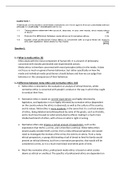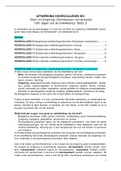Question 1:
1.1 What is media ethics: (5)
Ethics deals with the moral component of human life. It is a branch of philosophy
concerned with morally permissible and impermissible actions.
Media ethics is therefore concerned with moral principles (ethics) in the media. It does
not focus so much on general human behaviour, but rather specifically on how the
media and individual media practitioners should behave and how we can judge their
behaviour or the consequences of their behaviour.
1.2 Difference between meta-ethics and normative ethics: (10)
• Meta-ethics is devoted to the evaluation or analysis of ethical theories, whilst
normative ethics is concerned with people’s conduct or the way in which they ought
to conduct their lives.
• Normative ethics is based on societal expectations and highly informed by
legislation, and legislation in turn highly informed by normative ethics (dependent
on the country where the ethics is observed), as well as the culture of the country,
and its values. Meta-ethics is more academic in the sense that it is a critical analysis
of ethics, being debated and philosophized by some of the greats, such as Aristotle,
and is much less focused on what society deems ethical, making it a much more
intellectual branch of ethics, with a focus on what is right or wrong.
• Normative ethics also impose a certain amount of expectation, such as the
expectation that theft is a crime, and is therefore unethical. While Meta-ethics
would usually consider theft a crime, from a meta-ethical perspective, one would
need to investigate the motives of the crime, the victims et cetera. From a meta-
ethical perspective, a young child stealing a loaf of bread to feed his family would
present an ethical dilemma, but from a normative perspective, that would still be
considered a crime, as it is a much more black-and-white point of view.
• Much like normative ethics, professional media ethics is based on what society
deems as ethical or unethical. The specifics of professional ethics are dependent on
, the occupation (for example, a journalist has different professional ethics to a public
relations office) and is informed by a means of a code of conduct. These ethics are
enforced and regulated within the profession, by means of tribunals, or councils and
boards
1.3 Explain what professional media ethics is concern with and give 3 reasons why self-regulating
takes place by the media: (18)
Professional media ethics is concern with on what constitutes as professional or
unprofessional conduct, viewed from the perspective of a specific media occupation (eg
journalism or PR).
It cumulates in the drafting of a code of conduct by the members of the occupation,
voluntary adherence to the code, and the self-administering of the code’s stipulations to
ensure adherence3 by members; in other words, self-regulation. The institutions
administering self-control includes press- or media councils, press ombudsmen,
broadcasting complaints authorities, etc.
Three reasons:
• Historical reason- linked to development of occupation
• Professional reasons- where such codes are a prerequisite for recognition as a
professional by society
• Coercion- where governments threaten stricter legislation to force the media into
stricter self-regulation to maintain the political status quo.
Question 2:
2.1 List (3) meta-ethical theories: (15)
Aristotles Golden mean theory
- one of earliest theories
- key to ethical conduct is virtue (acting to reason or principle)
- believes character is more important than conduct
- Mean theory (moral virtue is a mean between two virtues, excess & deficiency)
- golden mean (virtue follows when people find middle ground between two extremes and
act accordingly)





